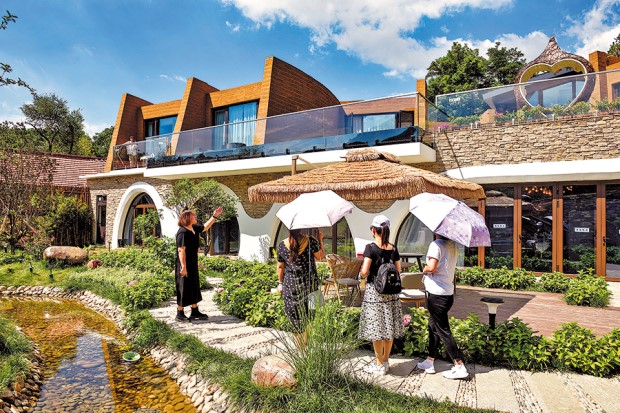

A homestay in Xijingyu village in Jizhou district, Tianjin, attracts visitors. [Photo provided to CHINA DAILY]
Mountainous Jizhou district in Tianjin embraced a significant influx of 3,000 runners from some 20 countries as the 21st Huangya Pass Great Wall Marathon kicked off on May 18.
The event brought big business to the area, especially for people offering accommodations.
"Some participants have been running in the contest for over a decade and have already reserved numerous homestays to enjoy the district's mountain views," said a spokesperson for the district.
Statistics indicate that over 300 boutique homestays have been established in the district since it ceased industrial production in 2018. Apart from those high-level homes, some agritainment projects such as vegetable planting and cultural dining activities were initiated by 2,089 families.
Both agritainment projects and boutique homestays have created a combined 60,000 job opportunities for local farmers.
Last year, the total revenue generated by homestays and agritainment projects reached 590 million yuan ($81.5 million), marking an 81 percent increase year-on-year.
Song Weilong, the Party chief and director of the Jizhou Culture and Tourism Bureau, said: "The district's tourism sector has flourished across 100 villages in 20 townships, and we have devised concrete development strategies to enhance branding and culture and to elevate the boutique homestay experience for guests."
Gao Cuilian, a 61-year-old entrepreneur from Changzhou village, was the first person in Jizhou district to open a homestay.
"I consistently update and enhance our offerings to tailor our services," she said.
Gao manages mid-range and high-end homestays featuring 60 rooms that can house up to 100 guests daily, as tourists' demand for stylish accommodations continues to increase.
Back in 1994, when she courageously established the inaugural homestay, few believed that the concept of "experiencing life and dining in a farmer's home on food with a light, non-greasy flavor" could yield any profits.
At that time, she refurbished her residence on the mountainside near the Jiushanding Scenic Area, the highest point in Tianjin that is also known as "the peak of nine mountains". She recalled preparing fish and duck dishes sourced from the mountain river for guests there.
These days, many villagers no longer personally manage their homestays, she said.
"Several have opted to lease their homestays for a few years to urban-based managers, securing stable returns," she explained.
Data reveals that in Xiaying township, 31 out of the 35 villages are operating homestays.
Reservations for homestays in villages with traditional architecture such as Guojiagou and Xijingyu typically require booking a month in advance.
"Homestays have now emerged as new economic drivers in the area, with a rising trend in homestay hybrid businesses such as bookstores, cafes and those themed around history and music — signifying a fresh wave in the fusion of culture and tourism," said Li Pengyue, Party chief of Xiaying.
yangcheng@chinadaily.com.cn

Copyright © 2024 Tianjin Municipal People's Government. All rights reserved.

Copyright © 2024 Tianjin Municipal People's Government. All rights reserved.